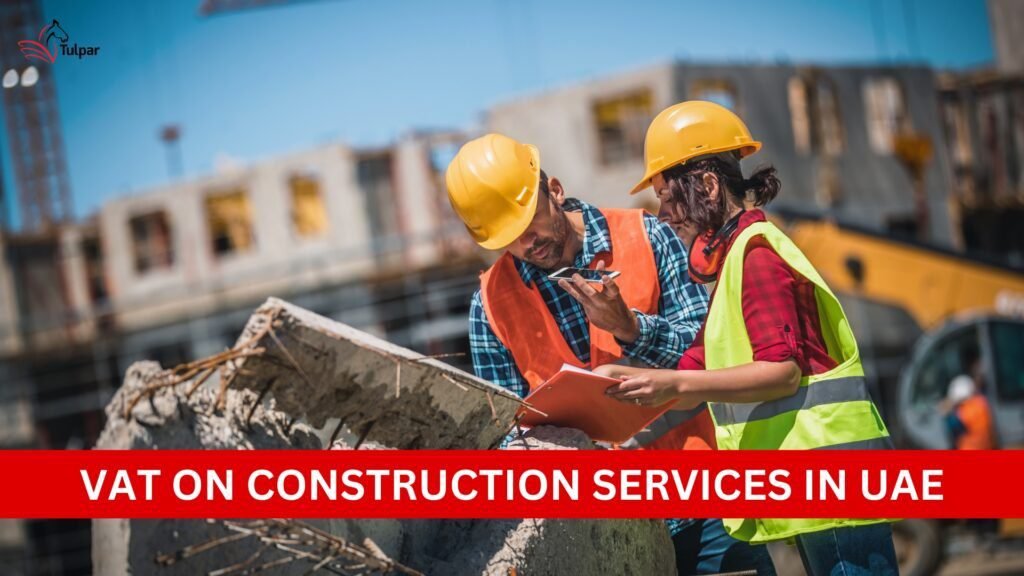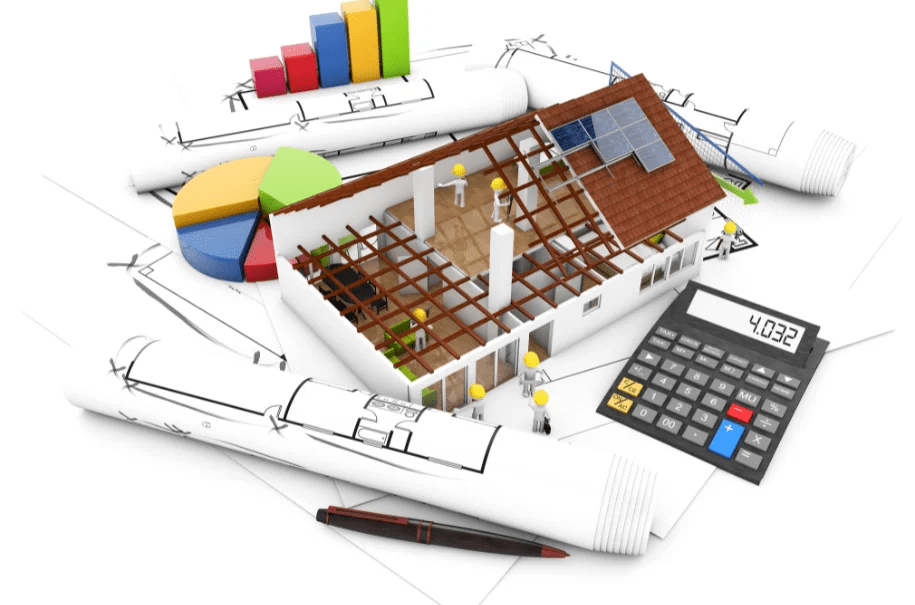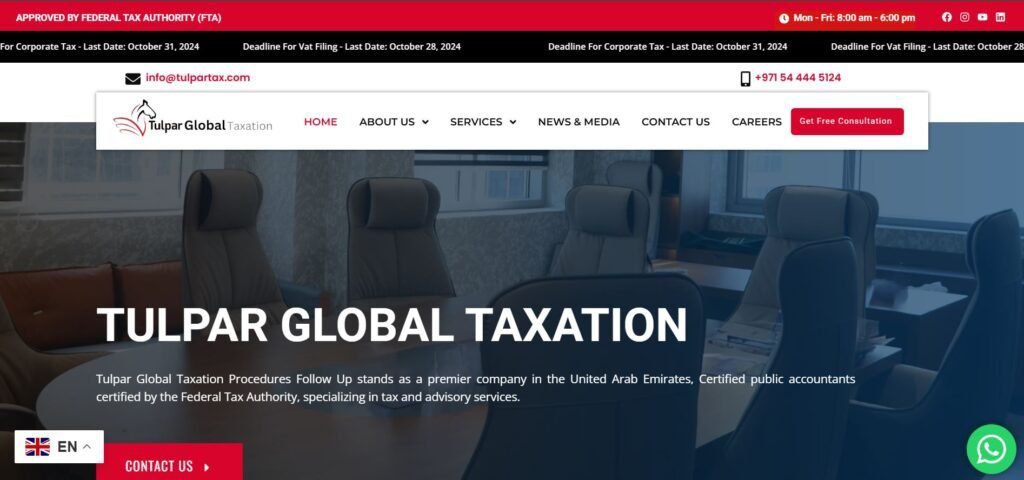
VAT on Construction Services in UAE
VAT on construction services in the UAE is generally charged at 5%, covering everything from building works and materials to project management, unless a specific zero-rated or exempt category applies. Understanding how VAT applies to contracts, progress payments, and subcontractor billing helps businesses stay compliant and avoid costly errors during audits.
Table of Contents
Related Articles


The Impact of CARF on UAE Crypto Traders | Ready to Report FTA

Feasibility Study Report Preparation in UAE

Let's Talk
Sign Up For Free Consultation
VAT on Construction Services in UAE
In the UAE, the implementation of VAT (Value Added Tax) on construction services has significantly impacted the sector, requiring businesses to adapt to new tax regulations. VAT, introduced in 2018 at a standard rate of 5%, applies to most goods and services, including construction. For developers, contractors, and subcontractors, understanding how VAT affects their operations is crucial for ensuring compliance and optimizing financial outcomes.
Construction companies must account for VAT on a variety of services, including building, renovation, and maintenance, as well as materials and labor costs. Without proper VAT planning, businesses can face significant tax liabilities and potential penalties. Tulpar Global Taxation Services offers specialized guidance to construction businesses in the UAE, helping them navigate VAT complexities and stay compliant with the ever-evolving tax laws.

The application of VAT in the construction sector is not always straightforward, as it depends on the nature of the service provided, the type of contract, and the parties involved. For instance, certain construction projects like residential buildings may be zero-rated for VAT purposes, while commercial developments may be subject to the full 5% VAT. In addition, the timing of VAT payments and invoicing can vary based on contract terms, affecting cash flow and financial planning.
Therefore, construction companies must stay informed about the specific VAT rules applicable to their projects to avoid overcharging or undercharging clients, which can lead to disputes and financial losses. Tulpar Global Taxation Services helps businesses understand these nuances, ensuring they are applying the correct VAT rates and adhering to all tax regulations.
For businesses looking to minimize their VAT liabilities and streamline their tax processes, expert assistance is key. Tulpar Global Taxation Services provides tailored strategies that help construction firms manage VAT obligations efficiently, from VAT registration to filing returns. Their team of tax professionals works closely with construction companies to ensure all aspects of VAT compliance are met, helping them avoid costly mistakes and optimize their overall tax strategy. By leveraging the expertise of Tulpar Global Taxation, construction businesses can focus on growth and profitability while ensuring they remain fully compliant with UAE VAT laws.
What is VAT and How Does It Apply to Construction?
VAT (Value Added Tax) is a consumption tax that is levied on the sale of goods and services. In simple terms, it is a tax added to the price of a product or service at each stage of production or distribution, based on its value added. VAT is typically paid by the final consumer, while businesses collect it on behalf of the government. In the context of the construction sector, VAT plays a crucial role in regulating transactions between contractors, developers, and suppliers.
It is essential for all construction-related businesses to understand how VAT applies to their operations, as failing to comply with tax regulations can lead to hefty fines and legal issues. In the UAE, the introduction of VAT in 2018 has had a significant impact on the construction industry.
How VAT Applies to Construction in the UAE
In the UAE, the standard VAT rate is 5%, and it is applied to the majority of goods and services, including those in the construction sector. Construction companies must charge VAT on the sale of construction services and goods related to the development of real estate, whether residential or commercial. This includes:
- Building Materials: Contractors must charge VAT on materials supplied for construction projects, such as cement, steel, and wood.
- Labour Services: VAT is applied to the charges for services rendered by construction workers, including subcontractors.
- Property Sales: When a developer sells a newly built property, VAT is typically applied to the transaction.
However, there are some exemptions and special cases in construction, such as the sale of residential properties that may be zero-rated under specific conditions. Developers should ensure that they are familiar with these exceptions to avoid overcharging VAT or failing to apply it where required. For construction companies, understanding VAT compliance goes beyond merely charging the tax. It involves maintaining accurate records of transactions, ensuring the correct VAT rates are applied, and submitting VAT returns to the Federal Tax Authority (FTA) in a timely manner.
Key Tax Regulations for UAE’s Construction Sector
The construction industry in the UAE is governed by a robust set of tax regulations, particularly following the introduction of VAT. These regulations are designed to ensure that construction companies operate within the legal framework and remain compliant with tax laws. Here are the key tax regulations relevant to the construction sector in the UAE:
- VAT Registration: Any construction company whose taxable supplies exceed the mandatory VAT registration threshold (currently AED 375,000) must register for VAT with the FTA. Companies with taxable supplies below this threshold can voluntarily register if they wish to claim input VAT.
- Zero-Rating of Residential Property: The UAE VAT law provides a zero-rate of VAT for the sale of residential properties, meaning that VAT is charged at 0%. However, this is only applicable to the sale of newly constructed residential properties and not for the sale of land or any property that has been previously occupied. Developers must ensure that they are applying the correct tax treatment when selling properties to end-users.
- Exemptions for Certain Services: The VAT law also exempts certain services in the construction sector from VAT. For instance, services related to the construction of new residential properties that are used for residential purposes may be exempt from VAT. On the other hand, commercial properties may attract the standard 5% VAT rate.
- Input Tax Recovery: Construction businesses can recover VAT on eligible expenses related to their projects through input tax credit. This includes VAT paid on goods, services, and materials purchased for use in construction projects. However, businesses must ensure that these expenses are directly linked to taxable supplies.
- Subcontractors and VAT Compliance: It is crucial for construction companies to manage VAT compliance across their entire supply chain, including subcontractors. If a contractor hires a subcontractor for a portion of the work, the subcontractor must apply VAT on the services provided. The main contractor is responsible for ensuring that the subcontractor’s VAT is properly recorded and that all documentation complies with FTA requirements.
- Project-specific Taxation: Large-scale projects, such as commercial developments, may involve complex tax treatment. Developers must ensure that the VAT rules are applied correctly across all stages of the construction process, from the supply of materials to the completion of the building and the eventual sale or lease of the property.
How VAT Affects Construction Projects in the UAE

In the UAE, Value Added Tax (VAT) has become a crucial factor influencing the financial dynamics of the construction industry since its introduction in 2018. The implementation of VAT has significantly impacted various aspects of construction projects, from pricing and budgeting to tax compliance. For construction companies, developers, and contractors, understanding the intricacies of VAT application is essential to ensure smooth project execution, accurate cost estimation, and efficient financial management. Proper VAT handling not only ensures legal compliance but also enables businesses to optimize profitability and maintain financial control throughout the lifecycle of construction projects.
VAT Impact on Construction Costs and Profits
VAT impacts construction costs in several ways. Since VAT is a consumption tax, it is levied on the goods and services used in construction, including building materials, subcontractor services, and labor costs. As a result, construction companies are required to charge VAT on the services they provide and on the materials they supply. For construction companies, VAT increases the overall cost of running a project. For example, purchasing construction materials or hiring subcontractors will incur VAT, which will then need to be added to the overall budget. This tax can directly influence profit margins, as the additional costs need to be accounted for in project pricing.
However, there is also an opportunity to recover VAT paid on purchases. Companies can claim input tax credit on goods and services purchased for the project. This means that while VAT affects costs initially, businesses can potentially recover VAT if they meet the necessary tax criteria. Proper VAT management and efficient financial planning are essential for maintaining healthy profit margins.
Key Considerations for Construction Companies in the UAE
When VAT is applied to construction projects, there are several key considerations construction companies need to factor in:
- VAT Registration: Any construction company with taxable supplies exceeding AED 375,000 is required to register for VAT with the Federal Tax Authority (FTA). Smaller companies may also choose to voluntarily register for VAT.
- Correct VAT Treatment: It is essential for construction businesses to understand the correct VAT treatment for different aspects of their projects, such as the sale of residential properties, the provision of commercial services, and the use of subcontractors.
- VAT on Property Sales: Developers need to be aware of the exemptions or zero-rated VAT on residential property sales. However, VAT is applicable on the sale of commercial properties.
- Input Tax Recovery: Businesses must understand how to recover VAT on eligible expenses, including construction materials, labor services, and overhead costs. Proper record-keeping and documentation are vital for this process.
VAT Challenges in UAE’s Construction Industry

Navigating VAT regulations can be particularly challenging for construction companies, especially in a rapidly growing industry like the UAE’s construction sector. With the evolving tax landscape, businesses must stay updated on the common VAT issues, such as incorrect rate application, subcontractor compliance, and proper documentation. By understanding these challenges and proactively addressing them, construction companies can avoid costly mistakes, mitigate risks, and ensure full VAT compliance, ultimately safeguarding their operations and maintaining financial efficiency in an increasingly complex regulatory environment.
Common VAT Issues in Construction Projects
- Incorrect VAT Rate Application: Misapplying VAT rates is a common issue. For instance, developers may apply the standard VAT rate to a property that qualifies for a zero-rate. Ensuring the right VAT rate for residential and commercial projects is critical.
- Subcontractor VAT Compliance: Often, subcontractors may fail to comply with VAT regulations, which affects the main contractor’s VAT filing. Main contractors must ensure subcontractors correctly apply VAT on their services.
- VAT Exemption Confusion: Understanding exemptions for certain services in construction, such as residential building services, can be difficult. Failure to apply exemptions correctly can result in overcharging VAT.
- Documentation and Record-Keeping: Inaccurate documentation of VAT on invoices and transactions can lead to compliance issues. Construction companies need to maintain proper records to ensure VAT returns are accurate and submitted on time.
How Tulpar Global Taxation Can Help Your Business
Navigating VAT regulations in the construction sector can be complex and time-consuming. Tulpar Global Taxation Services specializes in helping businesses in the UAE’s construction industry manage VAT compliance effectively. With in-depth expertise in UAE tax laws, Tulpar Global can help your business:
- Ensure VAT compliance across all project stages.
- Maximize input tax recovery.
- Resolve common VAT issues, including correct VAT rate application and subcontractor compliance.
- Provide comprehensive advice on VAT exemptions and zero-rating.
By partnering with Tulpar Global Taxation Services, your construction business can minimize risks and optimize tax efficiency.
VAT Compliance for Construction Companies in the UAE

To succeed in the construction industry, VAT compliance is a fundamental aspect of business operations. Ensuring adherence to tax laws not only helps construction companies stay in good standing with the Federal Tax Authority (FTA) but also prevents potential penalties and legal issues. Proper VAT management ensures accurate reporting, timely filing, and the correct application of VAT rates across various stages of a project, ultimately contributing to the financial stability and long-term success of the business. Compliance also builds trust with clients and stakeholders, positioning the company as a reliable and law-abiding entity in a competitive market.
Step-by-Step Guide to Complying with VAT Regulations
- Register for VAT: Construction businesses must register for VAT if their taxable supplies exceed AED 375,000 per year. Ensure you understand the registration process and timelines to avoid penalties.
- Determine VAT Liability: Assess which services and goods are subject to VAT, including construction materials, labor, and property sales. Determine the appropriate VAT rate for each transaction.
- Maintain Accurate Records: Keep thorough records of all VAT-related transactions, including invoices, receipts, and contracts. Proper documentation will help you file accurate VAT returns and support VAT claims.
- File VAT Returns on Time: Submit your VAT returns within the deadlines set by the FTA. Missing deadlines can result in fines or penalties.
- Ensure Subcontractor Compliance: When engaging subcontractors, ensure they are compliant with VAT regulations. As a contractor, you are ultimately responsible for the VAT treatment of services provided.
Avoiding Common VAT Mistakes in Construction Contracts
- Overlooking Input Tax Recovery: Many businesses overlook their eligibility to recover VAT paid on purchases. This can result in unnecessary costs. Ensure all eligible purchases are accounted for in your VAT claims.
- Incorrect Tax Rate Application: Applying the wrong VAT rate, especially when dealing with residential property sales, can result in overcharging or undercharging VAT. Always verify whether the property qualifies for zero-rating or standard VAT.
- Failing to Keep Proper Documentation: Incomplete or inaccurate records can lead to issues with VAT returns. Always ensure your documentation is complete, organized, and up-to-date.
Optimize Your Construction Business VAT Strategy with Tulpar Global Taxation

A strategic approach to VAT planning is crucial for managing tax liabilities and enhancing overall business efficiency in the construction sector. By implementing the right VAT strategy, construction businesses can minimize unnecessary costs, improve cash flow, and optimize profitability while ensuring full compliance with tax laws. Effective VAT planning allows companies to identify opportunities for input tax recovery, navigate complex exemptions, and streamline their financial processes. This proactive approach not only safeguards against potential penalties but also positions businesses for long-term success in a competitive and regulated industry.
How to Minimize VAT Liabilities in the Construction Sector
- Maximize Input Tax Recovery: Review all your expenses related to construction projects and ensure that VAT paid on eligible purchases is recovered.
- Take Advantage of Exemptions and Zero-Rating: Identify opportunities where your business can benefit from VAT exemptions or the zero-rate of VAT, especially in the sale of residential properties.
- Plan VAT-Effective Contracts: Ensure that your contracts are structured in a VAT-efficient manner, factoring in VAT obligations at every stage of the construction process.
The Role of Tax Consultants in Construction VAT Planning
A tax consultant plays a crucial role in helping construction businesses develop a strategic VAT plan that minimizes liabilities while ensuring full compliance with tax regulations. By working with a seasoned expert, businesses can identify key areas for tax savings, optimize input tax recovery, and avoid costly mistakes.
Tulpar Global Taxation Services offers specialized consultancy to guide businesses through the complexities of VAT planning, providing tailored solutions that ensure your construction projects remain VAT-compliant. With their expertise, you can navigate the tax landscape efficiently, maximizing financial benefits while staying fully aligned with the latest tax laws.
Why VAT in Construction is Crucial for UAE’s Real Estate Market

VAT has a significant impact on the UAE’s thriving real estate and construction sectors, influencing both cost management and overall profitability. For property developers and contractors, understanding how VAT applies to various stages of a project is crucial to maintaining accurate budgets and ensuring financial efficiency. VAT has a significant impact on the UAE’s thriving real estate and construction sectors, influencing both cost management and overall profitability. For property developers and contractors, understanding how VAT applies to various stages of a project is crucial to maintaining accurate budgets and ensuring financial efficiency.
VAT has a significant impact on the UAE’s thriving real estate and construction sectors, influencing both cost management and overall profitability. For property developers and contractors, understanding how VAT applies to various stages of a project is crucial to maintaining accurate budgets and ensuring financial efficiency. Whether it’s the VAT on materials, labor, or property sales, navigating these tax implications correctly is essential for controlling costs, optimizing profit margins, and ensuring compliance with the Federal Tax Authority’s regulations. A clear understanding of VAT helps developers and contractors manage cash flow effectively, avoid penalties, and make informed financial decisions throughout the project lifecycle.
How VAT Affects Property Developers and Contractors
For property developers, VAT affects the pricing of new homes, commercial buildings, and land. Developers must factor VAT into the cost of materials, labor, and services used in construction. Additionally, VAT is applied when selling newly constructed properties. Contractors also face VAT challenges, including the application of VAT to labor and subcontracted services. Proper management of VAT can impact profit margins and project cash flow.
Tulpar Global Taxation’s Insights for UAE Real Estate Projects
Tulpar Global Taxation Services offers invaluable insights to property developers and contractors, ensuring that all aspects of VAT in real estate projects are efficiently managed. From comprehensive tax planning to VAT registration, Tulpar Global’s expertise helps businesses navigate the complexities of VAT regulations with ease. Their team provides tailored solutions that not only ensure full compliance with the Federal Tax Authority’s requirements but also help businesses optimize their VAT strategy. With Tulpar Global, property developers and contractors can confidently manage VAT-related challenges, reduce tax liabilities, and enhance financial efficiency throughout the lifecycle of their real estate projects.
Practical Tips for Managing VAT in Construction Services

Effective VAT management is crucial for the success of construction businesses in the UAE, where the tax landscape can be complex and constantly evolving. With proper VAT planning and strict adherence to compliance, construction companies can streamline operations, reduce financial risks, and avoid costly mistakes. A well-structured VAT strategy ensures that businesses apply the correct tax rates, manage input tax credits efficiently, and meet deadlines for VAT filings. This not only fosters smooth project execution but also improves profitability by optimizing cash flow and minimizing tax liabilities, ultimately contributing to long-term financial stability.
Effective VAT Management for Construction Businesses
- Use Software for VAT Tracking: Implementing accounting software that tracks VAT automatically can help businesses stay organized and ensure accuracy in VAT filing.
- Regularly Review Contracts and Invoices: Make sure that VAT is applied correctly on all contracts and invoices, especially for large-scale projects that span multiple years.
Ensuring VAT Transparency in Your Construction Contracts
It’s essential for construction contracts to clearly outline VAT obligations to prevent misunderstandings and avoid potential disputes. By explicitly stating the VAT terms, including the applicable VAT rates, any tax exemptions, and the invoicing process, both parties can ensure transparency and compliance throughout the project. Clear VAT terms help prevent unexpected costs, ensure accurate billing, and streamline the VAT filing process. This clarity not only safeguards against legal and financial risks but also fosters trust between contractors, developers, and clients, ensuring a smooth and efficient project execution from start to finish.
By partnering with Tulpar Global Taxation Services, your construction business can effectively navigate the complexities of VAT compliance, minimize tax liabilities, and stay ahead of ever-changing industry regulations. With their expert guidance and tailored VAT strategies, Tulpar Global ensures your business not only meets all legal requirements but also optimizes tax management to maximize financial efficiency. Their in-depth knowledge of the UAE’s tax landscape helps construction companies thrive in the dynamic and competitive market, ensuring smooth project execution, enhanced profitability, and long-term success.
Mastering VAT on construction services in UAE is key to financial success in the construction industry. From understanding rates and exemptions to securing refunds, this guide equips you with the tools to stay compliant and competitive. Partnering with Tulpar Global Taxation, a leading FTA-certified consultancy, ensures your business navigates the UAE’s tax landscape with ease. Their expertise in VAT registration, filing, and refunds empowers construction firms to focus on growth while avoiding penalties.
Ready to optimize your VAT strategy? Contact Tulpar Global Taxation at tulpartax.com or explore FTA resources. Share your VAT challenges in the comments or download Tulpar’s free VAT checklist for construction businesses!
